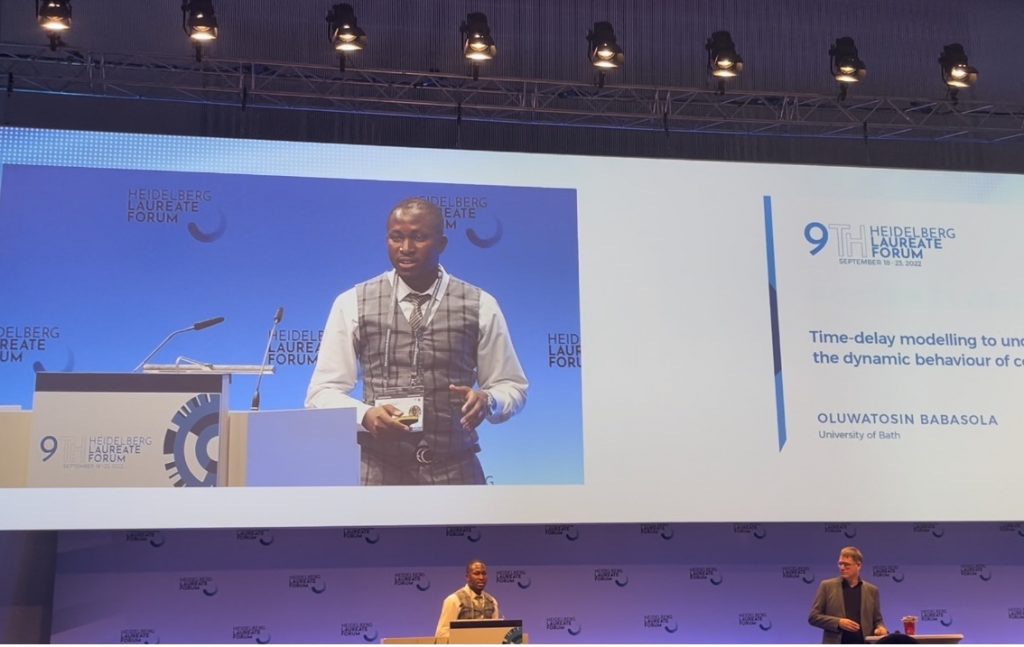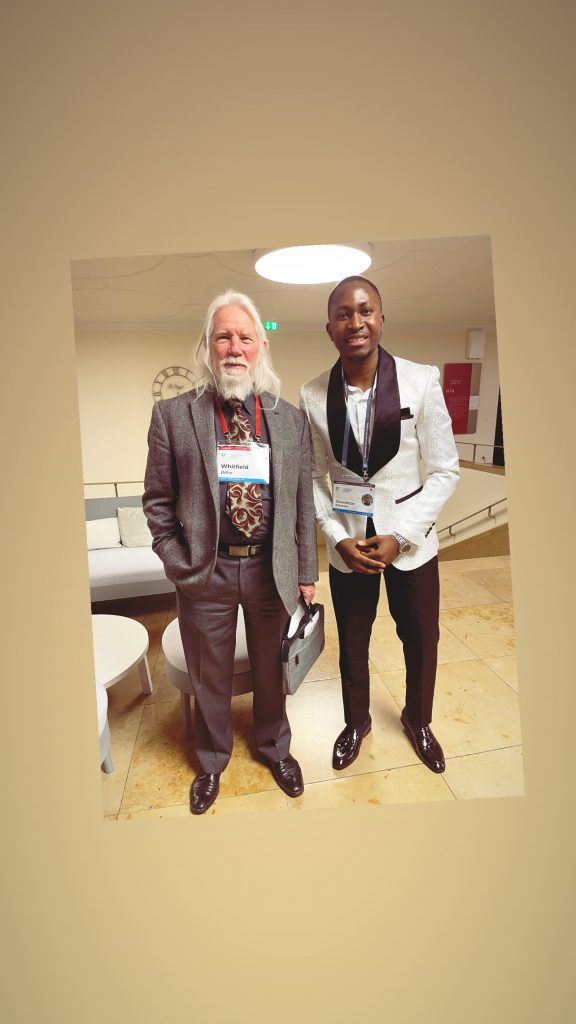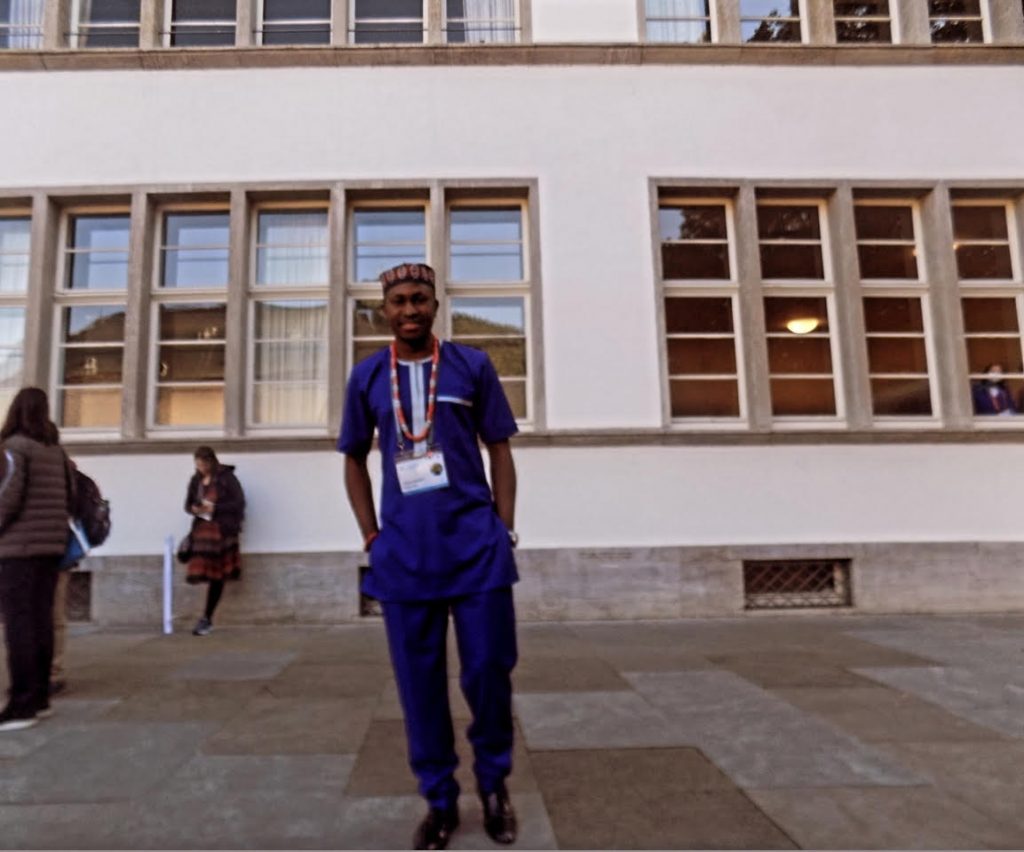An interview with Oluwatosin Babasola popularly known as “Tosin” by his friends and colleagues at this year memorable and historical physical 6 days’ week-long conference at The Heidelberg Laureate Forum (HLF) 2022 in Heidelberg -Germany.
By Hussaini Garba Mohammed, in Heidelberg, Germany
Can you please introduce yourself and how you where been selected among the young researchers to be at this wonderful event HLF 2022 to us?
My name is Oluwatosin Babasola and most time, my friends and colleagues call me “Tosin” which is a short form of “Oluwatosin”. I am a Nigerian but I’m currently living and also completing my PhD research in the UK at the University of Bath. I’m one of the 200 selected young researchers to participate at the 9th Heidelberg Laureate Forum – a networking conference between Laureates and young researchers. In addition, I’m one of the 30 selected young researchers selected to present their research in the presence of the Laureates and all invited participants.

Could you tell me about your area of expertise and your recent research activities in your country and abroad?
I will say my area of expertise is the general field of mathematics, but I am more inclined towards the so-called “applied mathematics”. Since I have gone through multiple trainings in all areas of mathematics (both pure and applied) which led to being awarded four master’s degree (3 MSc and 1 MRes) from different awarding institutions each in different country. Perhaps I could also add that I am fortunate to have all my programmes to be funded through scholarship.
I have conducted multiple research projects in diverse area such as numerical analysis, mathematical finance, infectious disease modelling, climate science and many more. I have done several industrial based research with mathematics team in the UK such as modelling the mismatch behaviour of bees, understanding the risk of covid19 transmission on trains and large events etc. However, my present research focuses on understanding the impact of climate change on agriculture where I mainly consider cocoa crops in Nigeria. I am working on using mathematical model to foster the understanding on the behaviour of the crops with respect to changing climatic variables and how it will influence the yields.
What are the benefits of performing research at the younger age? What did you not expect?
There are a lot of benefits in doing research at a young age. One of such benefit is that young researchers are often energetic and have less responsibility that could leads to distraction. Also, at a young age, there is an ample opportunity for researchers to explore different areas that seems interesting to them. In term of what I would not expect, I think researchers often needs to prepare for unforeseen circumstances because things don’t always go according to plans which made me to have this watchword “hope for the best but prepare for the worst”.
How many on-going projects you are working on that will help you to a higher level?
In as much I enjoy industrial based research, I understand that academic research are very important and collaboration is key. So, I have colleagues across Africa and Europe where we work collaboratively on research ideas. Some of the work focuses on improving our understanding on infectious disease such as covid19, Hepatitis B, HIV etc and making reasonable prediction through the calibration of model and data then identify the optimal control strategies. Looking into the future from what has been observed from the past, my next research plan is to incorporate machine learning, climate datasets to understand if there is a relationship between surge of disease and change in climatic pattern. With this, we could be able to predict the chances of disease transmission in a population.

How many countries have you travel to carry out your research or attended an international conference in in the last 5 years?
The way we travel recently is totally different to how it was pre-covid pandemic. Many travelling a researcher embark on is often for research work in form of a conference, workshops, seminars and even summer schools. In term of physical travelling, visa have always been the major challenge and many times, the event is often pass before applicants receive visa decision. However, with the use of Zoom/Teams or other online tools, researchers can attend scientific interaction from home. Although, I understand that online conference cannot fully replicate in-person conference experience, but it limits how researchers miss out in top conversations. However, in all, Over the years, I have travelled to South Africa, Kenya, UK, Poland, France, Italy, Switzerland, and Germany. In the next few months, I will be travelling to the US for the Joint Mathematics Meeting (JMM) and to Canada for mathematics study group with industry (provided my visa application decision come through early enough).

Do you have any tip for those who are now thinking about a career in scientific research?
The best tip I can possibly give those thinking about having a career in scientific research is to fuel the fire of curiosity and ask questions. Ideas often comes through interactions and your curiosity will motivate you towards pursuing such research. Also, if you have a great idea, endeavour to communicate to colleagues of like minds and perhaps collaborate because as a popular adage “two heads are better than one”. The research output for a joint project might provide better significance. Furthermore, do not disqualify yourself for any opportunity to seek for fund. Write research proposal and apply for grant, you might be amaze when you are awarded a competitive grant which you initially thought it’s almost impossible. Finally, always remember that science and mathematics is the tool to change the word but it’s totally incomplete if can’t communicate it effectively to non-expert.
How do become a mathematician considering that a lot of students in secondary don’t like maths as subject, and what is your advice do have for Nigerian students who want to be like you?
Just like many Nigerians, I started my education is Nigeria. I did my primary school to my first master’s degree in my state of origin (Kwara state). You might not be totally surprised to know that I didn’t apply to study Mathematics at the University. In fact, I applied to study Civil Engineering, but I wasn’t offered the course I applied for. Although it wasn’t because I didn’t meet the admission requirements but due to limited space (as I was told at the time). However, I was given the opportunity to choose other courses or re-apply a year later with a guaranteed admission provided I have similar JAMB score. So, instead of losing a year and re-apply to study engineering, I decided to choose mathematics and make most out of it. I graduated with first class degree and as one of the best students in my class. Moreover, I was awarded MTNF scholarship even before I completed my degree. So, my advice for many Nigerians is to thrive and make the best of every situation. They should understand that there are limited resources to cater for the entire population and therefore, they should be always prepared to make the best of little opportunities available. I will leave you with these popular saying “It’s better to be prepared for an opportunity and not have one, than to have an opportunity but not prepared” because nothing is more painful than missing an opportunity that could change your life positively.
